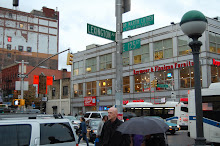So, here I was back at Eddie Prevost's weekly workshop for the second week in succession and the third time overall - enough to start to make me feel like a regular. As it was Good Friday, Eddie himself was away, leaving a gap to be filled. Guitarist Ross Lambert, a longtime workshop veteran and stalwart, ably stood in for Eddie, giving the all-important introductory talk and selecting the groupings to play together at the end. To help you make sense of that, maybe I should tell you a bit more about how the workshop operates...
Each week the workshop meets in the basement of a chapel on Southwark Bridge Road, within walking distance of Tate Modern. Typically, the workshop attracts between ten and twenty players, some of whom attend regularly, some occasionally, some once only. According to Eddie, the exact same group of players has never assembled twice. The players are seated in a ring, evenly spaced a comfortable distance apart. Those with equipment such as electronics or a short-wave radio will have a table in front of them. There is an upright piano in one corner of the room.
The brief introductory talk emphasises that the workshop is a safe space, a place to try out new ideas and to experiment. After it, the lights are dimmed to a comfortable level, and an adjacent pair of players (let's call them A and B) are chosen to start playing a duo. There is no set duration for a duo; it is at the discretion of the players themselves. When player A stops playing (often indicating so with a look or a nod to player C on the other side of B) C begins and the duo of B and C continues to play. And so on anticlockwise around the ring, C & D, D & E etc, ending up with N & A, bringing the duo full circle. By then, every player will have played in two duos, one with each of their immediate neighbours. The rest of the time they will have been sitting and listening. Depending on how many players attend, these opening duos altogether last up to an hour and three quarters.

Anyway, after the opening duos are complete, whoever is leading then asks various larger groupings (often trios) to play together. The choices of personnel are based on what the leader has heard during the duos. This week, as there were fourteen of us present (and time was short because the duos went on quite a long time) Ross opted for two septets, plus a quartet and a trio. After the duos, it was a strange experience to play in a larger grouping - the larger the grouping, the stranger it feels. In the septet, I had to be very conscious not to hide or to underplay. In the quartet, I felt more exposed and was conscious again not to opt out or hide, which is easily done.
After everyone has packed away and paid their £3 subs (to pay for the hire of the hall), there is a tradition that all the players go to a local pub in order to chat and socialise. This aspect of the workshop is in keeping with the underlying ethos, which is supportive and communal with no emphasis on individual egos. For the next two Fridays, I cannot attend the workshop, having other commitments (gigs by Mats Gustafsson and by Humcrush). I am greatly looking forward to both of those, but already feel a sense of regret at missing the workshop. Yes, I am beginning to feel like a regular...

could you tell me wether the workshops are still running and if they are would I be able to attend,
ReplyDeletethank you,
Be.